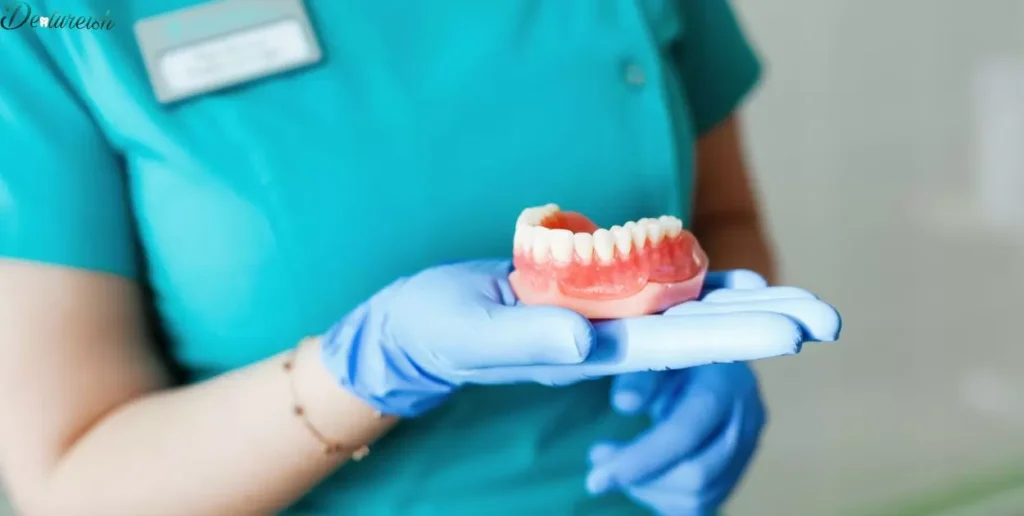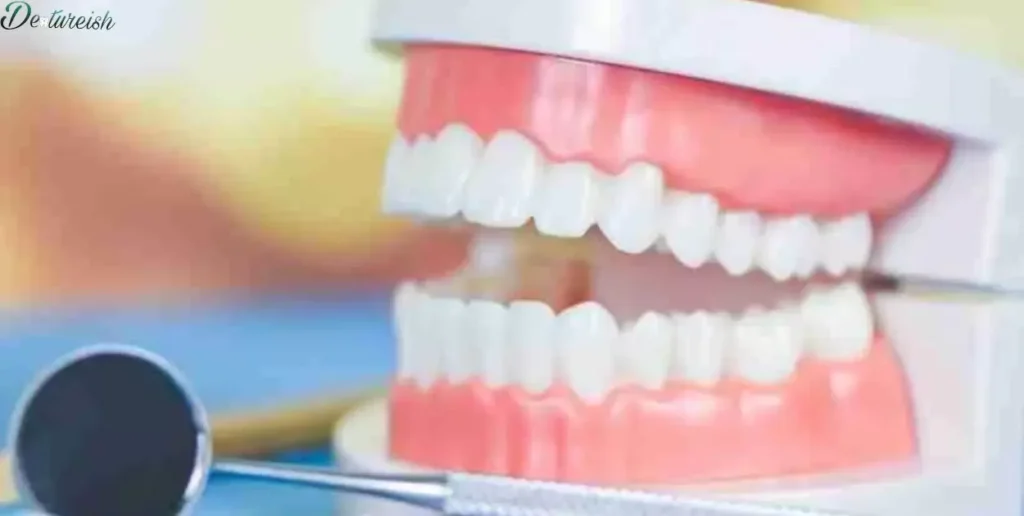Getting dentures involves the process of replacing missing teeth with removable artificial teeth. This common dental solution helps restore the ability to chew and improves overall oral aesthetics. Dentures can be full or partial, depending on the extent of tooth loss.
Are you ready to transform your smile and regain confidence? Embarking on the journey of getting dentures for the first time can be a life-changing experience. Picture yourself embracing a new chapter with a radiant smile – take the leap towards a brighter, more self-assured you today!
Getting dentures for the first time can be a positive step towards restoring your smile and oral function. It involves a consultation with a dentist, impressions of your teeth, and a fitting process to ensure comfort and functionality in your new dentures.
Tips For First Time Denture Wearers
If you’re new to wearing dentures, here are some helpful tips to make the adjustment smoother. First, start with softer foods to get used to chewing and speaking. Clean your dentures daily with a non-abrasive brush and mild soap to maintain good oral hygiene.
Ensure a proper fit by visiting your dentist for adjustments if needed. Practice speaking and reading aloud to enhance your speech with dentures. Lastly, be patient, as it may take time to adapt, but with these tips, you’ll soon feel comfortable and confident with your new dentures.
Understanding the Need for Dentures
Dentures are artificial teeth and gums designed to replace missing natural teeth. People opt for dentures when tooth loss occurs due to aging, injury, or decay. These removable appliances restore the ability to chew, speak, and maintain facial structure, improving overall oral function and appearance.
The need for dentures arises when tooth loss affects daily activities and self-esteem. Dentures offer a practical solution, allowing individuals to regain confidence in their smile and enjoy a better quality of life. Regular dental check-ups help assess the need for dentures and ensure proper fitting for optimal comfort and functionality.
Exploring Denture Options
Choosing dentures involves exploring various options. Dentures come in different types, such as full and partial, each serving specific needs. Dentists customize these prosthetics for a comfortable fit, ensuring they restore both function and aesthetics.
Considerations for denture selection include lifestyle, budget, and oral health. Patients collaborate with their dentist to find the best fit and design. By exploring denture options actively, individuals can regain confidence in their smile and enjoy improved oral function.
Preparing for Denture Consultation
Getting ready for your denture consultation is simple. Begin by gathering information about your dental history, any existing issues, and your desired outcomes. Make a list of questions to ask your dentist, such as potential treatment options and expected timelines.
Next, organize your current dental records and bring them to the consultation. This will help your dentist understand your oral health better. Lastly, be ready to discuss your budget and any concerns you may have. Taking these steps ensures a productive and informative denture consultation tailored to your specific needs.
Initial Dental Examination
When you go for your first dental checkup, the dentist will perform an initial dental examination. They will examine your teeth, gums, and mouth to check for any signs of decay, gum disease, or other issues. The dentist may also take X-rays to get a closer look at your teeth and identify any hidden problems.
During the initial dental examination, the dentist will ask about your dental history and any concerns you may have. They will discuss proper oral hygiene practices and provide advice on maintaining a healthy smile. This visit helps the dentist create a personalized plan for your dental care and ensures early detection of any potential dental issues.
Discussion on Tooth Extraction
Tooth extraction is a common dental procedure where a dentist removes a tooth from its socket in the jawbone. Dentists typically recommend extraction for severely damaged, decayed, or impacted teeth that cannot be saved through other treatments.
During the extraction, the dentist numbs the area with local anesthesia and uses special tools to loosen and remove the tooth. After the procedure, patients may experience some discomfort and are advised to follow post-operative care instructions for a smooth recovery.
Nervous About Getting Dentures
Feeling nervous about getting dentures is natural. Many people worry about their appearance, eating habits, and speaking with dentures. Your dentist will guide you through the process, addressing any concerns. Embrace the positive changes that come with dentures for an improved smile and better oral health.
Understanding common fears associated with dentures helps ease anxiety. Concerns may include fit, appearance, and maintenance. Seek advice from your dentist and connect with others who have gone through this transition. Adapting to dentures is a gradual process, and with patience, you’ll regain the ability to enjoy your favorite foods and confidently engage in conversations.
Customizing Your Denture Design
Creating a personalized denture design enhances comfort and functionality. Dentists carefully tailor the shape, color, and fit to suit individual preferences and needs. This customization ensures a natural look and improved oral well-being.

Patients actively participate in the customization process, providing input on aesthetics and functionality. The result is a denture that feels and looks just right. Personalized denture designs contribute to a confident smile and a better overall dental experience.
Denture Material Choices
Choosing denture materials is crucial for comfort and durability. Dentures can be made from acrylic or metal, each with its own benefits. Acrylic dentures are lightweight and affordable, while metal dentures are more robust and suitable for long-term use.
Consider your lifestyle and budget when deciding on denture materials. Acrylic is a popular choice for its affordability, but if durability is a priority, metal dentures might be the better option. Your dentist can guide you in selecting the right material based on your needs, ensuring your dentures provide both comfort and longevity.
Step-by-Step Denture Fitting Process
| Step | Description |
| 1 | Initial Assessment: Evaluate oral health and discuss patient expectations. |
| 2 | Impressions: Take precise molds of the patient’s gums to create a customized fit. |
| 3 | Bite Registration: Record how the upper and lower jaws fit together for proper alignment. |
| 4 | Wax Try-In: Create a mock-up of the dentures in wax to assess fit, shape, and aesthetics. |
| 5 | Final Adjustments: Fine-tune the dentures based on patient feedback for optimal comfort. |
| 6 | Delivery: Provide the completed dentures and educate the patient on care and maintenance. |
Managing Expectations for First-Time Denture Wearers
For first-time denture wearers, it’s crucial to set realistic expectations. Dentures may initially feel unfamiliar, but regular practice in wearing them helps in adaptation. Dentists recommend patience and persistence, emphasizing that discomfort typically decreases over time.
Understanding that adjustments may be necessary is key. Denture wearers should communicate openly with their dentist about any concerns or discomfort. By actively managing expectations and staying proactive in seeking guidance, first-time denture wearers can enhance their overall experience and comfort.
How To Remove Dentures For The First Time
Removing dentures for the first time is a simple process. Begin by rinsing your mouth with water to loosen the adhesive. Gently wiggle the dentures with your fingers, starting from the front and moving towards the back, until they come loose.
Once the dentures are loose, tilt them forward slightly to release any remaining adhesive. Avoid using excessive force to prevent damage. If you encounter any difficulty, consult your dentist for guidance on proper removal techniques. Remember, practice makes perfect, and with time, you’ll become more comfortable removing your dentures effortlessly.
Caring for Your Oral Health Pre-Denture
Good oral health before getting dentures is crucial. Brush your teeth twice a day with fluoride toothpaste and floss daily to prevent cavities. Regular dental check-ups help catch issues early, ensuring a healthy mouth for denture preparation.
Maintain a balanced diet rich in calcium and vitamin D for strong teeth. Avoid sugary snacks and tobacco to prevent gum problems. Taking proactive steps for oral health pre-denture ensures a smoother transition to dentures and promotes overall well-being.
Common Concerns About Denture Appearance
- Fit and Comfort: Many worry about dentures feeling uncomfortable or not fitting securely. A well-fitted denture, custom-made by a dentist, can address this concern, providing comfort and stability.
- Natural Look: Concerns about the artificial appearance of dentures are common. Modern dentures are designed to closely resemble natural teeth, ensuring a more authentic and appealing look.
- Speech Challenges: Some fear that dentures may affect their speech. With practice, individuals can adapt to speaking with dentures, and any initial challenges tend to diminish over time.
- Maintenance: People often worry about the maintenance of dentures. Regular cleaning and proper care, as advised by your dentist, can keep dentures in good condition.
- Social Confidence: Concerns about how dentures may impact social interactions are common. However, many individuals find that properly fitted dentures enhance their confidence and improve their overall quality of life.
Eating and Speaking Tips with New Dentures
Wearing new dentures Take the time to make a smooth transition by following these essential eating tips. Chew slowly and on both sides to avoid any discomfort during your meals. Starting with softer foods such as yogurt and mashed potatoes can significantly ease the adjustment period. Additionally, practicing your speech by reading aloud daily will help enhance your communication skills with dentures. Remember, patience and consistent effort are key to making the most of your denture-wearing experience.
When it comes to speaking with dentures, enunciate clearly and practice pronouncing challenging words. Regularly clean your dentures to maintain proper fit and avoid slips while talking. Embrace these simple tips for eating and speaking with new dentures to make the adjustment period more comfortable and enjoyable.
First Time Denture Wearer Problems
Many first-time denture wearers face initial challenges. Adjusting to the feel and fit of dentures can be uncomfortable at first, causing sore spots or difficulty in speaking and eating. Regular dental check-ups and adjustments are crucial to ensure a comfortable and effective transition to denture wearing.
In addition, new denture wearers may experience increased saliva production initially. This common issue often resolves with time as the mouth adjusts to the presence of dentures. Maintaining good oral hygiene and following the dentist’s guidance can help minimize problems and ensure a smoother experience for those adapting to wearing dentures for the first time.
Adapting to Denture Maintenance Routine
Taking care of dentures is crucial for maintaining oral health. Regular cleaning with a soft brush and mild soap helps prevent plaque buildup and ensures a fresh feeling. Soaking dentures in a denture cleanser overnight keeps them bacteria-free, promoting overall oral hygiene. Developing a simple and consistent denture maintenance routine contributes to a comfortable and healthy dental experience.

Proper storage when not in use prevents warping or damage. Regular check-ups with a dentist for adjustments and assessments ensure dentures fit well and function effectively. Embracing a proactive approach to denture care fosters confidence and allows individuals to enjoy the benefits of a well-maintained smile.
Addressing Discomfort and Soreness
Uncomfortable dentures? Don’t worry! Ease discomfort with proper adjustments. A skilled dentist ensures a snug fit, preventing soreness. Take charge of your comfort and enjoy a pain-free experience with well-fitted dentures.
Regular check-ups matter. Dentists identify issues early, avoiding discomfort. Proactive care keeps your dentures comfortable and irritation-free. Stay ahead of soreness with simple, timely adjustments. Your comfort is a priority in maintaining a happy, healthy smile.
Follow-Up Appointments and Adjustments
When it comes to dentures, follow-up appointments are crucial. During these visits, your dentist makes adjustments to ensure a comfortable fit. These appointments help enhance the functionality of your dentures, ensuring they feel natural and work well for you.
Regular follow-ups also allow your dentist to address any issues promptly. Adjustments may be necessary as your mouth adapts to the dentures. By staying on top of follow-up appointments, you can maintain optimal oral health and enjoy the benefits of a well-fitted denture.
Denture Process From Start To Finish
Getting dentures involves several steps. First, the dentist examines your teeth and takes impressions. Then, a mold is created to make custom dentures that fit your mouth perfectly. Once the dentures are ready, they are placed and adjusted for comfort.
The denture process doesn’t end there. Regular check-ups are essential to ensure they fit well and function properly. Cleaning them daily and handling them with care helps maintain their longevity. Overall, the denture journey is a series of simple yet crucial steps to restore your smile and oral functionality.
Social and Psychological Aspects of Denture Adoption
Many people face challenges when adapting to dentures. Adjusting to the physical changes can impact self-esteem. Social support plays a crucial role in easing this transition.
The psychological aspects involve accepting the new appearance and functionality. Positive reinforcement from friends and family fosters a smoother adaptation process. Overall, understanding the social and psychological dimensions of denture adoption helps individuals navigate this significant change with greater ease.
Long-Term Denture Care and Maintenance
Taking care of your dentures is crucial for long-term use. Clean them daily with a soft brush and mild soap to remove food particles and plaque. Soaking them overnight in a denture solution helps maintain their shape and keeps them free from bacteria.
Regular dental check-ups are essential to ensure a proper fit and address any issues promptly. Avoid using hot water or abrasive cleaners, as they can damage dentures. With consistent care, your dentures will stay comfortable and last longer, allowing you to enjoy a confident smile for years to come.
Same Day Dentures Process
Getting same-day dentures is a quick and convenient process. First, your dentist will examine your oral health and take impressions. Then, a skilled technician crafts the dentures on-site, ensuring a precise fit. Finally, you can leave the dental office with your new dentures on the same day, restoring your smile without waiting.
The same-day dentures process offers a time-efficient solution for those needing immediate tooth replacement. Dentists prioritize efficiency, examining, molding, and crafting dentures swiftly. This approach allows patients to enjoy the benefits of a complete smile without the typical delays associated with traditional denture procedures.
Potential Challenges in Denture Usage
People using dentures might face challenges. Keeping dentures comfortable can be tricky due to changes in the jaw. Regular dentist visits are crucial to address these issues and ensure dentures work well.

Adjusting to speaking and eating with dentures is another challenge. Initially, some may find it hard to articulate words or eat certain foods. Practice and gradual introduction of different textures can improve these skills. Proactive care and perseverance are essential to overcome challenges linked with denture usage.
Celebrating Milestones: Life with Dentures
Embracing life with dentures brings about various milestones worth celebrating. Adjusting to new oral routines and gaining confidence in social settings are some initial achievements. Regular dental check-ups play a crucial role in maintaining oral health, ensuring a continued positive experience with dentures.
Individuals find joy in rediscovering the pleasure of eating and speaking comfortably. Overcoming initial challenges fosters a sense of accomplishment, making each day with dentures a step towards a fulfilling and vibrant life.
Denture Tips And Tricks
Caring for dentures becomes easier with a few helpful tips. Firstly, it’s crucial to clean dentures daily using a soft-bristle brush and mild soap to prevent plaque buildup. Soaking them overnight in a denture solution helps maintain freshness and cleanliness.
Handling dentures with care is vital. When removing or cleaning them, it’s advisable to do so over a folded towel or basin of water to avoid damage if they slip. Regular dental check-ups are essential for adjustments and ensuring the overall well-being of your dentures. Following these simple tips can enhance the longevity and comfort of denture usage.
Frequently Asked Question
What to expect when you first get dentures?
When you first get dentures, anticipate an adjustment period for speaking and eating. Regular follow-ups with your dentist will be crucial to address any fitting issues and ensure comfort.
How long does it take to get used to dentures for the first time?
Adjusting to dentures varies, but most people become accustomed within a few weeks. Consistent use and practicing speaking and eating can speed up the adaptation process.
What not to do when you first get dentures?
Avoid using hot water to clean dentures and refrain from biting into hard or sticky foods initially to prevent damage and discomfort during the adjustment period.
Do new dentures hurt at first?
New dentures may cause discomfort initially as your mouth adjusts to them. However, any persistent pain should be addressed with your dentist for proper fitting adjustments.
Conclusion
Embarking on the journey of getting dentures for the first time is a significant step towards regaining confidence and oral functionality. It marks a transformative experience, offering individuals the opportunity to embrace a renewed smile and improved quality of life.
As one navigates the initial adjustments, the keyword here is undoubtedly “adaptation,” as the transition to dentures involves not just a physical transformation but also a mental and emotional adjustment to a new and improved dental reality. Embracing this change opens the door to a more comfortable and fulfilling oral health journey.

